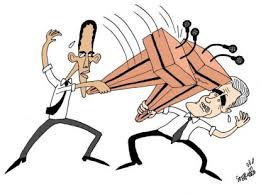记忆方法
将“derogatory”分解为“de-”(表示否定或去除)和“rogatory”(源自拉丁语的“rogare”,意为询问或请求)。记忆方法:想象有人提出一个无礼或贬低的请求(rogatory),我们对其表示否定或反对(de-)。这样,“derogatory”就关联上了贬义或否定意义。
以上内容由AI生成, 仅供参考和借鉴
英语词源
- derogatory (adj.)
- c. 1500, from Late Latin derogatorius, from Latin derogatus, past participle of derogare "to take away, detract from, diminish," also "repeal partly, restrict, modify," from de- "away" (see de-) + rogare "ask, question, propose" (see rogation).
权威例句
- 1. He refused to withdraw derogatory remarks made about his boss.
- 他拒绝收回那些贬损老板的话。
- 2. Such conduct will be derogatory to his reputation.
- 那样的行为将会毁损他的名誉.
- 3. He had drawn a derogatory statement from George.
- 他已经逗出乔治一句毁贬的话.
- 4. His tones implied that Michael was not the man his father was; a bit derogatory.
- 言外之意是,迈克尔同他父亲的为人不一样, 这实际上等于贬低迈克尔.
- 5. Shvabrin criticized the poem severely and went on to make derogatory remarks about Maria.
- 希瓦卜林极力贬低这首诗,并说了许多诋毁玛利亚的话.
